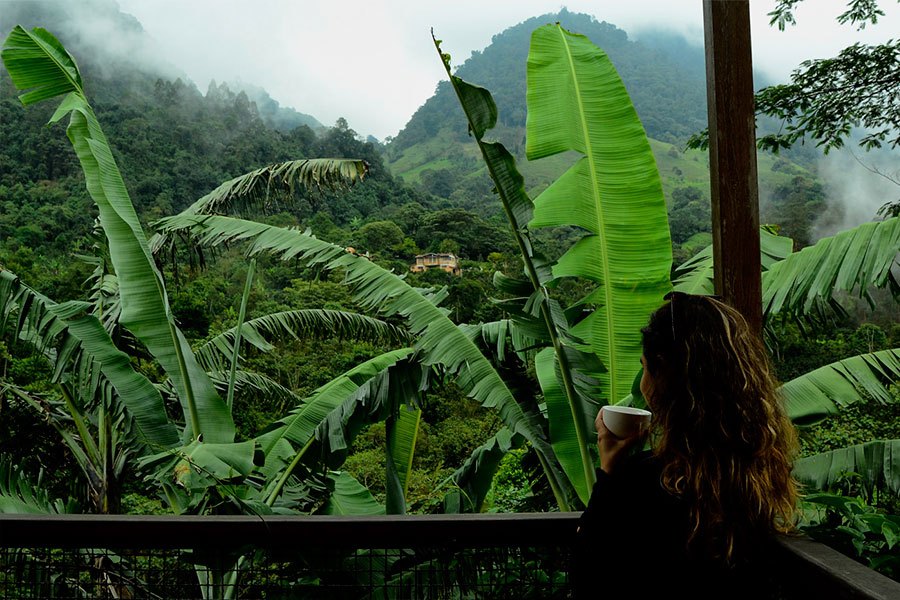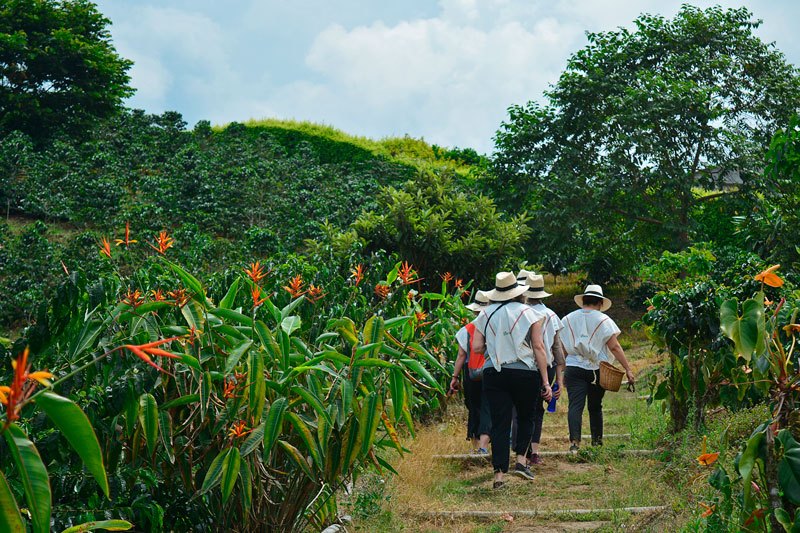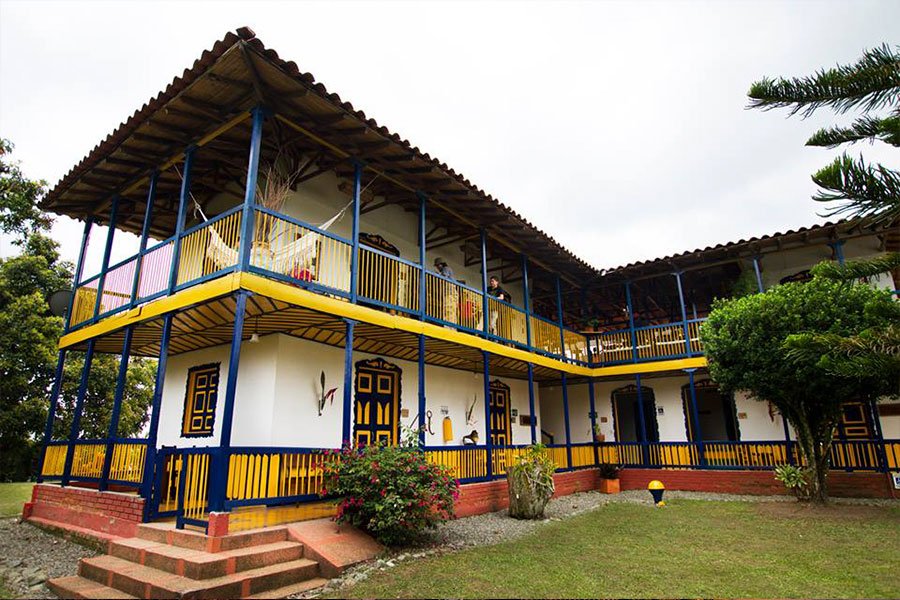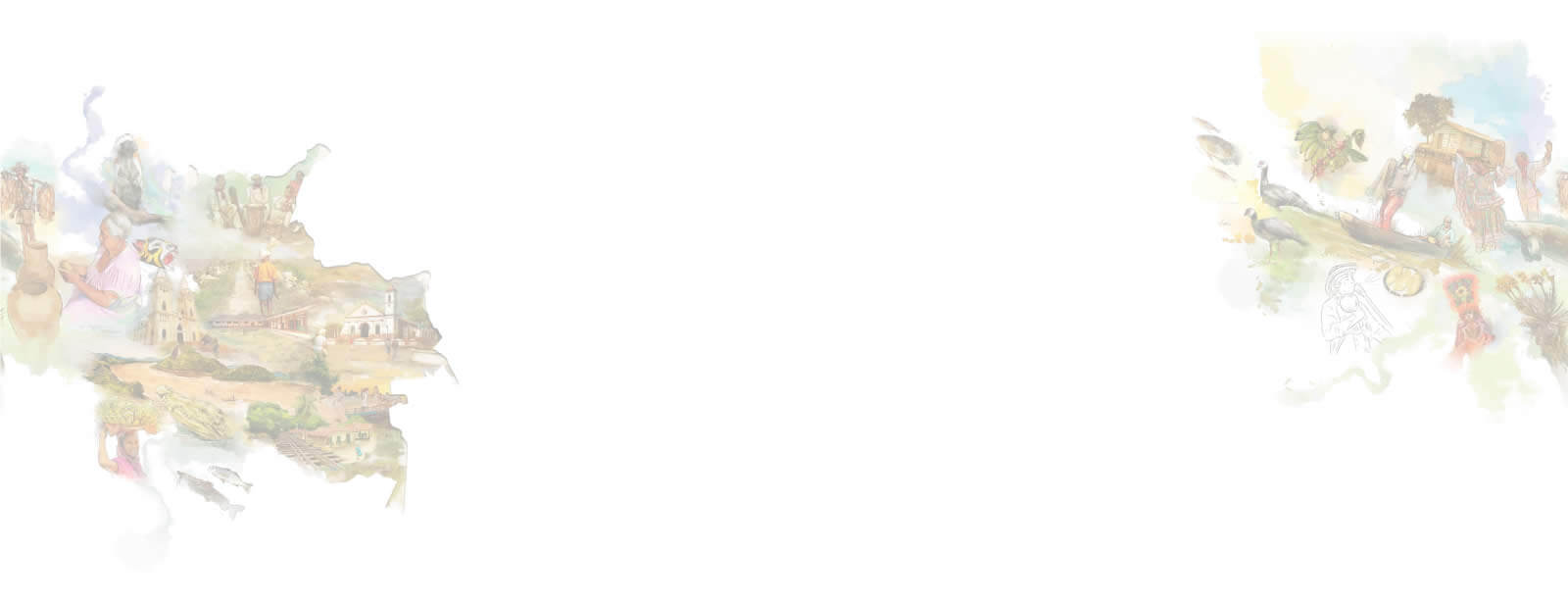COLOMBIA
Discover the immersive experiences behind a cup of Colombian coffee
COLOMBIA

Coffee experiences that you can live in Colombia
Colombian coffee is one of the best in the world. Since Colombia is a country so close to the equator, there is a high luminosity guaranteed throughout the year. Being home of the longest mountain range in the world, The Andes -which splits into three major branches or cordilleras- explains the variety of the several thermal floors that withholds about 3.3 million hectares, of which 914 thousand are planted with coffee.
Furthermore, the three Andean ranges that separate the Amazon from the Colombian coasts over the Pacific and Atlantic oceans, and the fact that is the only country in South America that borders both oceans, creates remarkable weather conditions for growing this valuable cherries throughout the year.
There are two important varieties of coffee in the world: Robusta and Arabica. The latter, due to its high quality, needs a specific climate set to grow. As a result of the tropical and isothermal Colombian weather (without any real change of seasons), the country produces a balanced Arabica Colombian coffee.
The history of coffee
The origins of coffee are not precisely known. The most reliable history of coffee goes back to Abyssinia, which is known today as the Ethiopian Empire, located on the northeastern side of the African continent. The legend tells about how Pastor Kaldi, a goat herder, discovered coffee after noticing the strange and energetic behavior of his goats after having the berries of a certain three.
He shared his findings to the abbot of the local monastery, who after many experiments, discovered the nice smell of burning the fruit. Therefore, it lead to the idea of roasting the beans that turned into a beverage that would help him last through a long evening of prayers.
About the entrance of coffee to Colombia
The most verified version of the history of Colombian coffee in the country, explains that the Jesuits missionaries brought coffee seeds to Popayán and planted them in 1736 at the seminary of the community in that city.
Discover: Where to enjoy a luxury vacation in Colombia
Colombian Coffee as an experience
For many people, having a cup of coffee is a wonderful experience. It can be what gathers two friends from a very long time, evoke a nice memory or just a nice solo moment. However, today coffee is so rewarding, it is time to live a more fulfilling experience and expand the feeling.
Thankfully, Colombia provides just that. As a result of an already diverse portfolio of tourism activities in the country, this widens as well for the coffee lovers out there. It is time for you to get to know what is behind your regular cup of Colombian coffee.
We have assembled some of the best coffee experiences you can have in Colombia. By living them, you will immerse in the Andean cordillera that sees millions of coffee crops born so that you can plant, pick, select, thresh and roast your Colombian coffee.
Colombian coffee brands experiences by region
Cundinamarca – La Palma y el Tucán Coffee Adventures

Discover La Palma y el Tucán a state farm full of Colombian coffee experiences
Just one hour away from Bogota, at Zipacón (close to Zipaquirá), you can find 9 beautiful cabins between 13 hectares of coffee fields. For the owners of La Palma y el Tucán, it all began when they started to commercialize their coffee and invited all their friends and clients over to the farm, to witness the process behind a cup of Colombian Coffee.
Once more people started coming, they realized that sharing the real and unique experience with the world was the perfect opportunity to transmit their knowledge, empower the stakeholders and create value around Colombian coffee production.
It was all about rethinking not only the practices of Colombian coffee production, for more sustainable ones but the coffee tourism experiences as well. At La Palma y el Tucán, everything that you eat is organic and harvested at the state farm.
La Palma y el Tucán - The Colombian coffee brand experience
La Palma y el Tucán offers different types of Colombian Coffee experiences such as:
Accommodation at one of their cabins strategically located in different spots of the state farm to awake in the middle of coffee trees. Each location it’s unique because the view, the sunsets and even the sound of nature are different throughout the area.
Day Tour for the people who just want to spend the day at the state farm and experience all the processes behind their coffee production and sustainable model.
The tour includes:
• Guided tour around the coffee plantation
• Visit the Wet Mill and Drying stations
• Cherry-picking and quality selection demonstration
• Coffee Tasting
• Brewing demonstration by their International Guest Barista
• Lunch
Check out other complementary activities such as coffee cupping, where their international guest barista will teach you how to differentiate specialty coffee and all its variations. Also, you will also learn about brewing preparation and methods.
Don’t miss their Late Art 101 workshop either!
Extra points for their program Neighbors and Crops. A sustainable coffee relationship model to incentivize Colombian coffee growers to become more active in the industry.
You might be interested: Let Caño Cristales amaze you
Risaralda – Finca del Café

Enjoy all the wonderful activities you can do at Finca del Café
Risaralda is a department of Colombia located between the central and western cordillera of the Andean region of the country. Here, the capital district is Pereira and just 20 minutes away on the road you will find Finca del Café.
Finca del Café started as a family state farm located in the middle of the Coffee Cultural Landscape. Due to the coffee trees and mountains that surround the property, they learned more about the process of artisanal Colombian coffee production just as their grandparents did it.
Encouraged by sharing the process, they decided to build an 8-room boutique hotel and design their own Colombian coffee experience through their values. For this reason, as soon as you sign up for the tour, you will get dressed in a poncho, a hat and a knitted basket just as any other worker at the farm to live this experience.
An experience in the Coffee Cultural Landscape of Colombia
Finca del Café offers different types of Colombian Coffee experiences such as:
Accommodation at the state farm in any of the 8 spacious fully equipped rooms with a beautiful view of the landscape and gardens.
A coffee tour in which you will learn about the Coffee Cultural Landscape of Colombia (PCC) one of Unesco's World Heritage List. Therefore, it is considered a productive landscape that has developed a unique culture around Colombian coffee, social capital, and the coexistence between tradition and technology.
The tour includes:
• Guided tour across the Specialty Coffee plantations, where they teach you how is the process from sowing, the selective hand-picking, and the de-pulping process.
• Roasting of the Specialty Coffee beans in firewood at their peasant house
• The teaching of different preparation techniques to enjoy a delicious cup of the softest Speciality Coffee they grew
Check out other complementary activities such as Luna del Café. Especially, because each month on a full moon night, they make a fire in the middle of the coffee plantation to share stories with live music and storytellers. Furthermore, the purpose is to support local artists who are interested in transmitting the coffee culture.
Don’t miss their coffee lemonade!
Extra points for having a special plantation for tourists called Lote del Turista where you can sponsor your own Specialty Coffee plant and even get mailed pictures throughout the whole productive life of the tree.
Discover: Five unbeatable reasons to go birdwatching in Colombia
Quindío - Combia Inspiración

At Hacienda Combia, you will learn all about the sustainable cycle of Colombian coffee.
Quindío is another department of Colombia right below to Risaralda department that is also part of the Colombian Coffee District. There, the main city is Armenia and just driving 25 minutes to the southeast, you will find Hacienda Combia.
Combia Inspiración began with the heritage of a great-grandfather's house who had the property during the colony period more than 130 years ago. Hence, the family who inherited it decided to produce their own Specialty Colombian Coffee, and turn the state farm into a small hotel and design a unique coffee tour.
Combia Inspiración offers a main Colombian coffee route tour but also provides any tailor-made activities if requested.
A really immersive coffee experience
The coffee route tour has 10 stations which purpose is to explain, through a very experiential and conscious experience, the sustainable cycle of coffee through its fauna, flora and the symbiotic relations between them to create a clean cup of coffee.
To recreate the conscious part of the tour, the Inspirator (or tour guide) will give you a coffee walnut key. Then, as you pass through the most important stations, you will get a token. Each token will balance the cup of Colombian coffee you will make and prepare because each part of the coffee production ecosystem literally balances the result.
Some stations and experiences of the tour are:
• Welcoming Station that includes a coffee tasting session where the inspirer will teach the tourists to recognize a high-quality coffee and distinguish the 36 aromas you can find in a cup of coffee.
• Coffee picking once you know how you like your cup of coffee. Therefore, they will guide you to choose the appropriate cherries to resemble it.
• Coffee Mill visit where tourists can observe, understand and interact with the process of moist coffee benefit while understanding its importance in the Coffee Cultural Landscape
• Earth, water, fauna and flora stations to understand the importance of these elements through the cycle and get your tokens!
Check out the Basketry station where a basket maker will teach you to cut bamboo and extract the fibers to weave your own basket. Once you finished, you will tie it up and then look for the cherries.
Don´t miss the pottery station where you can make, bake and paint your own cup of coffee!
Extra points for their super immersive and conscious experience-stations where you can get into a human-size bird nest or into a deep cave to feel just as a coffee root.
Either you decide to stay the night in one of these Colombian coffee state farms or just take the day tour, the purpose is to learn, connect and experience the wonderful world of Colombian coffee production.
After experiencing what's behind your Colombian cup of coffee, and people ask you: What does Colombian coffee taste like? The answer might be: “guess you had to be there”.



















